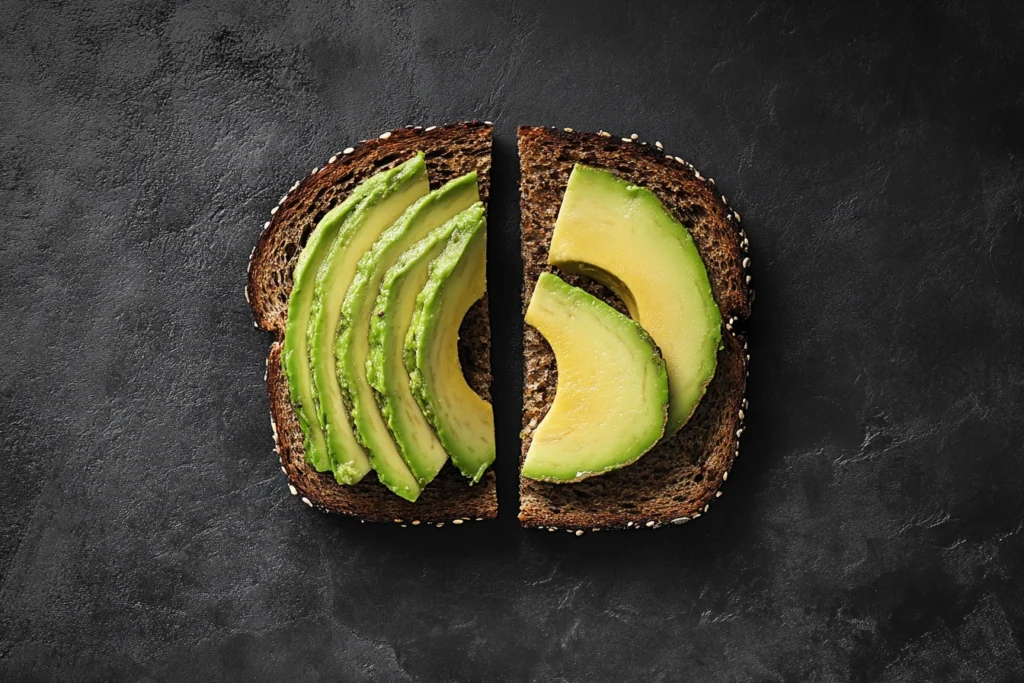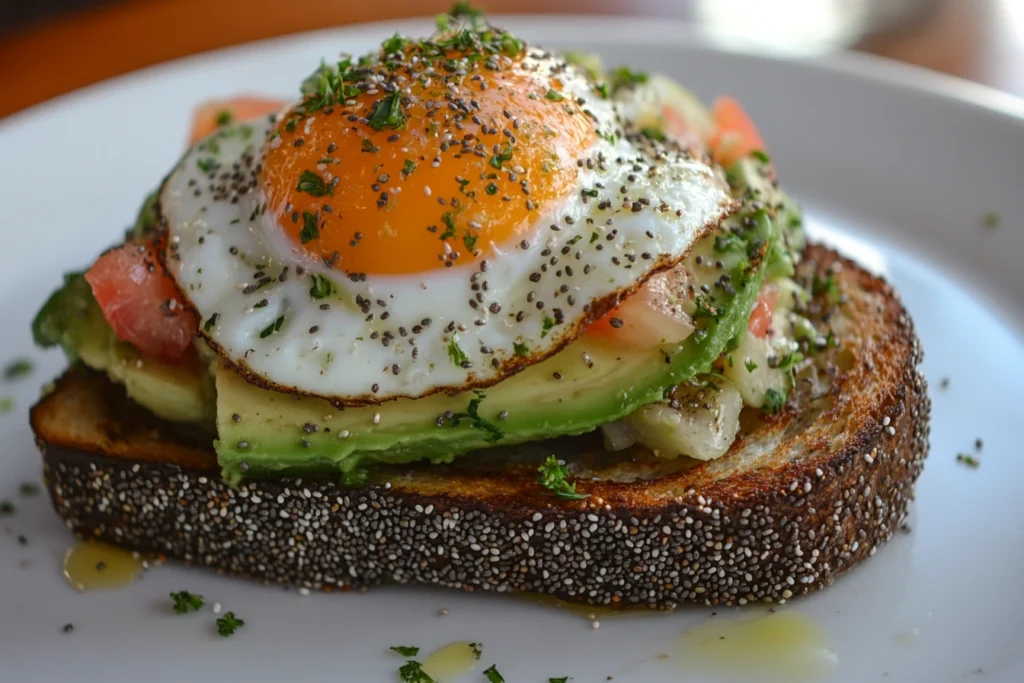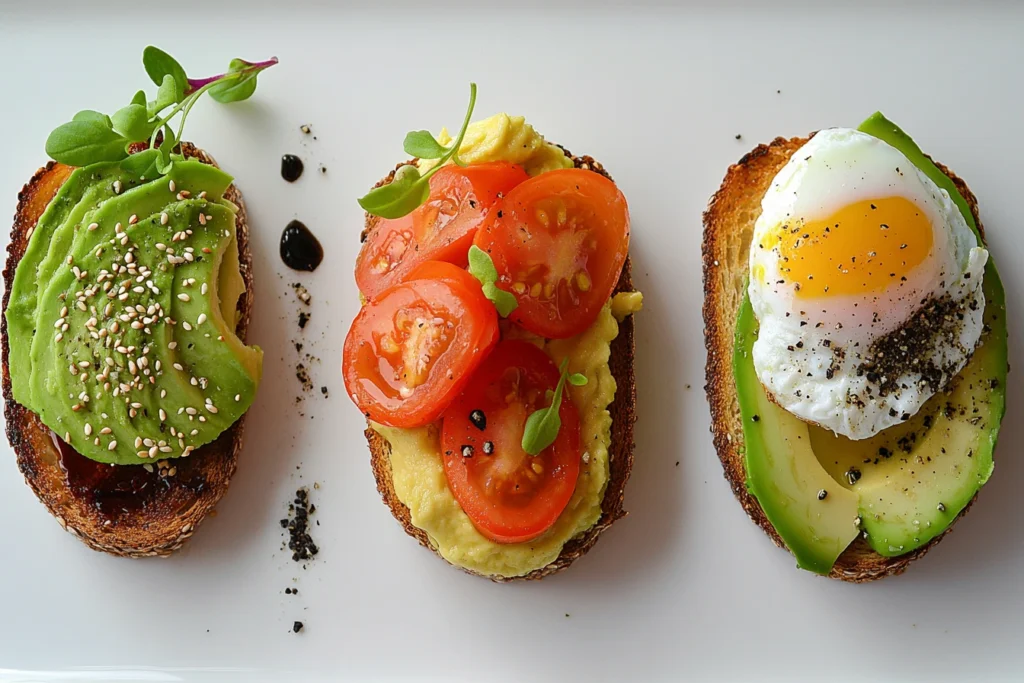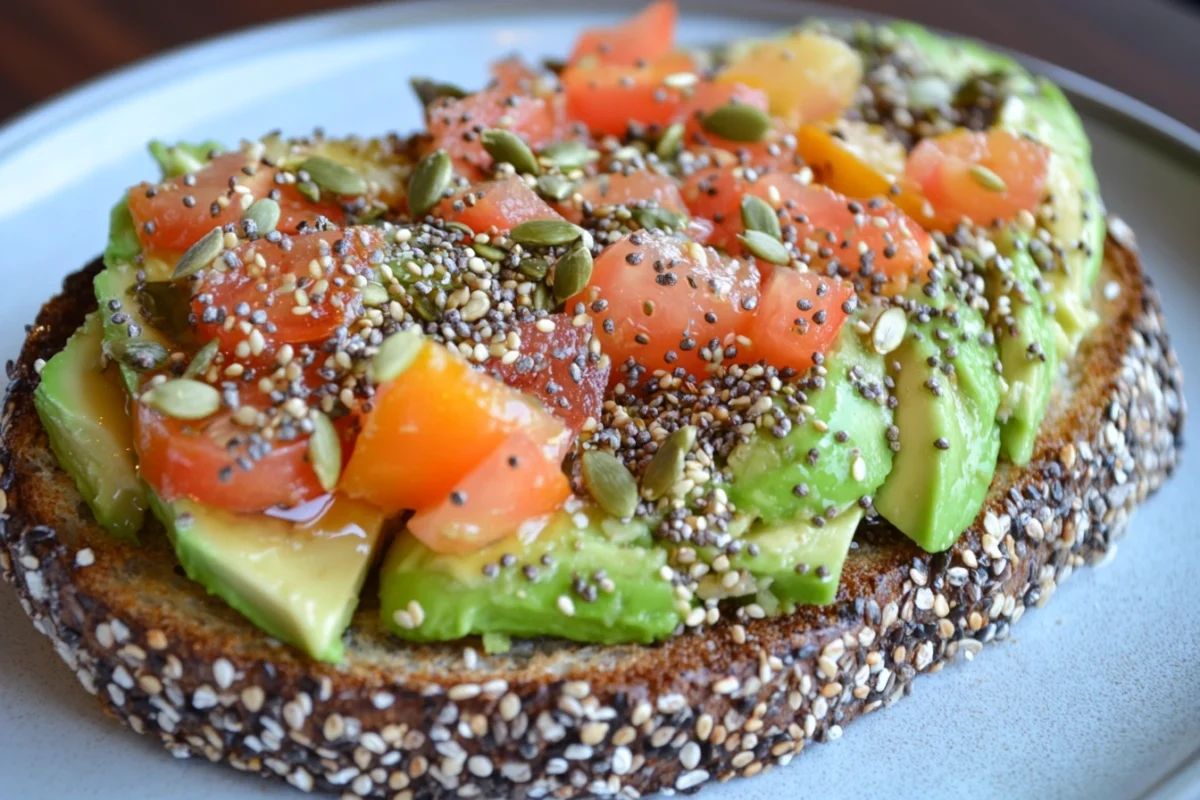Avocado toast has taken the world by storm, becoming a go-to option for health-conscious eaters. But beyond its trendy appeal, there’s so much more to uncover about this dish. From its caloric content to its health benefits, potential drawbacks, and customizable options, we’ll dive into every aspect of avocado toast. This guide will give you the knowledge to make informed choices about enjoying this delicious and nutritious meal.
Introduction
Overview of Avocado Toast
Avocado toast isn’t just another breakfast fad; it’s a modern culinary icon. The combination of creamy avocados spread over a crispy piece of bread offers a balance of flavors and textures that’s both satisfying and versatile. While traditionally associated with millennials, this dish appeals to foodies of all ages. Its popularity spans social media platforms and restaurant menus, turning it into a breakfast staple across the globe.
Popularity and Cultural Significance
What makes avocado toast such a cultural phenomenon? Beyond its nutritional allure, it has become synonymous with a lifestyle centered around health and convenience. It’s also an Instagram darling, loved for its vibrant green hues and the creativity it inspires in plating. Restaurants and cafes worldwide have embraced this dish, customizing it with unique toppings and artisan bread to cater to diverse palates.
Purpose of the Article
This article aims to go beyond the surface and uncover the facts about avocado toast calories—from what’s inside a standard serving to how variations affect its nutritional profile. Along the way, we’ll explore its health benefits, potential drawbacks, and tips for making it work for different dietary needs. Whether you’re a devoted fan or a curious foodie, you’ll walk away with a deeper appreciation for avocado toast.
Nutritional Breakdown of Avocado Toast
Calories in a Standard Serving
When discussing avocado toast calories, the starting point is the baseline: a simple slice of toasted bread topped with mashed avocado. On average, a standard serving contains between 200 and 250 calories, depending on the portion size and bread type. Whole-grain bread, often used for its health benefits, can contribute about 80–120 calories per slice, while the avocado portion adds roughly 130–150 calories per 50 grams. These numbers may seem modest, but portion sizes and toppings can quickly tip the calorie scale.

Variations Based on Bread Type
The bread you choose plays a significant role in the overall calorie count. For example:
- White Bread: Typically higher in calories and lower in fiber, around 100–120 calories per slice.
- Whole-Grain Bread: Offers more fiber and nutrients, with a calorie range of 80–100.
- Gluten-Free Bread: Often denser and higher in calories, clocking in at 120–150 per slice.
Choosing nutrient-dense bread can make your toast more filling and nutritious while keeping the calorie count reasonable.
Impact of Additional Toppings
Toppings are where things get creative—and caloric. Adding a poached egg, for instance, contributes about 70 calories, while a sprinkle of cheese could add anywhere from 50 to 100. Even healthy choices, such as smoked salmon (35 calories per ounce) or a drizzle of olive oil (120 calories per tablespoon), can push your meal beyond the “light breakfast” category. When piling on extras, moderation is key to keeping your avocado toast aligned with your dietary goals.
Macronutrient Profile
Understanding the macronutrients in avocado toast is crucial to assessing its overall nutritional value. Here’s a breakdown:
Fats: Types and Benefits
The creamy avocado topping is rich in healthy monounsaturated fats. These fats not only improve satiety but also support heart health by helping to regulate cholesterol levels. With about 10 grams of fat in a single serving, avocados make this dish both delicious and nutrient-packed.
Carbohydrates: Fiber Content and Sources
The toast provides carbohydrates, essential for energy. Opting for whole-grain bread can increase your fiber intake, which promotes digestion and helps control blood sugar levels. A typical slice of whole-grain bread contributes about 3–5 grams of fiber.
Proteins: Contribution to Daily Intake
Avocado toast isn’t just about carbs and fats; it also delivers some protein, especially if you add toppings like eggs or nuts. A basic serving contains about 4 grams of protein, but with protein-rich extras, you can easily reach 10–15 grams.
Micronutrient Highlights
Vitamins Present in Avocado
Avocados are a treasure trove of vitamins, particularly Vitamin K, which supports bone health, and Vitamin E, a powerful antioxidant. You’ll also find notable amounts of Vitamin C and B vitamins, which boost immunity and energy.
Minerals Found in Common Toppings
Popular additions like tomatoes, seeds, and greens contribute minerals such as potassium, magnesium, and iron. These nutrients not only elevate the dish’s flavor profile but also enhance its health benefits.
Health Benefits of Avocado Toast
Heart Health
Avocado toast is a heart-friendly meal, thanks to its high content of monounsaturated fats. These healthy fats are known to help lower bad cholesterol levels (LDL) while increasing good cholesterol (HDL). By improving cholesterol profiles, avocado toast contributes to reducing the risk of heart disease. Additionally, the fiber from whole-grain bread and avocados helps maintain healthy blood pressure and supports overall cardiovascular health.

Fiber’s Role in Cardiovascular Wellness
Each serving of avocado toast contains approximately 6–8 grams of dietary fiber. This fiber not only keeps your digestive system on track but also aids in lowering cholesterol levels and reducing the risk of atherosclerosis. When paired with nutrient-rich toppings like leafy greens or seeds, you’re giving your heart even more support.
Weight Management
Many people wonder if avocado toast calories align with weight management goals. The answer lies in its balance of nutrients. The combination of fiber and healthy fats promotes a sense of fullness, helping to curb unnecessary snacking throughout the day.
Satiety Factors: Fats and Fiber
Avocados contain oleic acid, a type of monounsaturated fat that enhances feelings of satisfaction after a meal. Combine that with the fiber in both the avocado and whole-grain bread, and you’ve got a dish that keeps you fuller for longer. This can help prevent overeating and assist in maintaining a healthy weight.
Comparisons with Other Breakfast Options
When stacked up against sugary cereals or high-fat pastries, avocado toast is a clear winner. Its lower sugar content and nutrient density make it a superior choice for sustained energy. Plus, the versatility of toppings allows you to adjust it to suit your caloric needs.
Antioxidant Properties
Presence of Vitamins E and C
Avocados are packed with antioxidants, primarily Vitamins E and C, which protect the body from oxidative stress and support healthy skin and immunity. Vitamin E, in particular, works to combat free radicals that can lead to cellular damage and aging.
Benefits of Additional Ingredients
Toppings like cherry tomatoes, radishes, or even a sprinkle of chia seeds amplify the antioxidant power of avocado toast. These extras provide nutrients like lycopene, polyphenols, and flavonoids, further supporting your body’s defense systems.
Potential Drawbacks
Caloric Density
While avocado toast calories may seem modest in a standard serving, it’s easy to underestimate how quickly they can add up. Avocados themselves are calorie-dense, with approximately 240 calories per fruit. Adding toppings like eggs, cheese, or seeds can push your meal into high-calorie territory, making portion control crucial.
Risks of Overconsumption
Overindulging in even healthy foods can lead to weight gain or hinder weight loss goals. Consuming large portions of avocado toast, especially with rich toppings, might exceed your daily caloric needs without you realizing it. To keep things balanced, measuring out ingredients can help. Stick to about half an avocado per serving and opt for lighter toppings when possible.
Portion Control Recommendations
To avoid turning avocado toast into a calorie bomb, consider these tips:
- Limit bread size: Choose a single, thin slice of whole-grain bread.
- Measure avocado: Use about 50 grams or 2–3 tablespoons of mashed avocado per serving.
- Mind toppings: Stick with nutrient-dense, low-calorie options like greens, radishes, or a sprinkle of seeds instead of calorie-heavy additions.
Allergies and Sensitivities
As with any food, avocado toast isn’t universally suitable for everyone. Some individuals may experience allergic reactions or sensitivities to ingredients like avocados or bread.
Common Allergens in Toppings
Popular toppings such as nuts, seeds, or dairy products can trigger allergies in susceptible individuals. Always check labels and be cautious if serving avocado toast to guests with dietary restrictions.
Gluten Considerations
For those with gluten intolerance or celiac disease, traditional bread is off the table. Fortunately, there are numerous gluten-free bread options available. These alternatives are often made with almond flour, rice flour, or other gluten-free grains, though they may be higher in calories.
Customizing Avocado Toast for Different Dietary Needs

High-Protein Variations
For those looking to boost their protein intake, avocado toast can be transformed into a muscle-friendly meal with a few simple additions.
Adding Eggs or Legumes
Adding a poached or fried egg on top of your avocado toast can provide about 6–7 grams of protein per egg. For a plant-based alternative, mashed chickpeas or lentils are excellent options that also add texture and fiber.
Incorporating Seeds and Nuts
Sprinkling chia seeds, hemp seeds, or crushed almonds over your toast introduces healthy fats and proteins. For example, just one tablespoon of hemp seeds adds around 3 grams of protein.
Low-Carbohydrate Options
If you’re following a low-carb diet, you don’t have to say goodbye to avocado toast entirely. Creative substitutes for traditional bread can make this dish keto-friendly.
Using Alternative Breads
Opt for low-carb bread made from almond or coconut flour, which significantly reduces the carbohydrate content. These alternatives are widely available and often rich in fiber.
Vegetable-Based Toast Substitutes
For a creative twist, use sliced sweet potato or grilled eggplant as a base instead of bread. These options are naturally lower in carbs while adding a unique flavor to your dish.
Vegan and Vegetarian Adaptations
Avocado toast is naturally vegetarian but can also be made entirely vegan with simple tweaks.
Plant-Based Protein Additions
For vegan protein boosts, consider toppings like edamame, tofu crumbles, or a drizzle of tahini. These not only enhance the flavor but also contribute essential nutrients like iron and calcium.
Dairy-Free Toppings
Cheese lovers can substitute dairy-free options like almond ricotta or cashew cream. These alternatives are creamy, flavorful, and align perfectly with a vegan lifestyle.
Frequently Asked Questions (FAQs)
How many calories are in avocado toast?
The calorie count of avocado toast depends on its ingredients. A standard serving, typically made with one slice of whole-grain bread (80–100 calories) and about 50 grams of mashed avocado (130–150 calories), totals around 200–250 calories. However, adding toppings like eggs, cheese, or seeds can raise the calorie count significantly.
How many calories are in 2 pieces of toast with avocado?
If you’re doubling your serving to include two slices of toast with avocado, the calories will likely range between 400 and 500 calories, depending on the bread type and the amount of avocado used. For instance, two slices of whole-grain bread may contribute 160–200 calories, while 100 grams of avocado adds another 260–300 calories.
Can you eat avocado toast and still lose weight?
Yes, you can enjoy avocado toast and still lose weight. Its balance of fiber, healthy fats, and nutrients helps promote satiety, reducing the likelihood of overeating later in the day. The key is portion control: limit the avocado to about 50 grams and choose nutrient-dense bread like whole grain. Avoid calorie-heavy toppings like large amounts of cheese or oils if you’re monitoring your calorie intake.
Is avocado toast good for your diet?
Absolutely! Avocado toast is an excellent addition to a balanced diet. It provides essential nutrients, including vitamins E and K, healthy fats, and fiber, which support heart health, digestion, and overall wellness. Additionally, it’s versatile enough to fit various dietary plans, from vegetarian to keto. By customizing the toppings and portion sizes, avocado toast can be tailored to your specific dietary goals.
Conclusion
Summary of Key Points
Avocado toast is more than just a food trend—it’s a nutritional powerhouse that caters to a variety of dietary preferences. With approximately 200–250 calories per serving, this dish balances healthy fats, fiber, and essential nutrients like vitamins E and K. It’s a versatile option that supports heart health, weight management, and overall well-being. From customizing toppings to suit different diets to controlling portion sizes, avocado toast offers endless opportunities for healthy eating.
Final Thoughts on Incorporating Avocado Toast into a Balanced Diet
Whether you’re seeking a nutrient-packed breakfast, a quick lunch, or a post-workout snack, avocado toast fits the bill. Its adaptability allows you to enjoy it in ways that align with your health goals, making it an easy and delicious choice for every lifestyle. Remember, moderation and creativity are the keys to maximizing its benefits while keeping calorie intake in check. So, grab your favorite bread, mash some avocados, and start experimenting with toppings—you’ll never get bored with this timeless dish!

